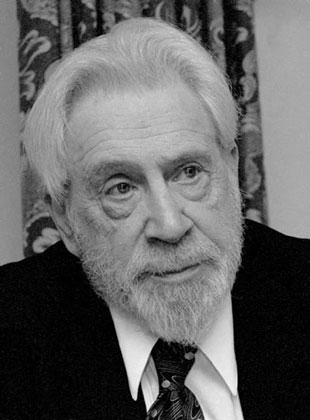
news /contact us / links
Anthony Hecht was born in New York City in 1923. His books of
poetry include The Darkness and the Light (Alfred A. Knopf, 2001);
Flight
Among the Tombs (1996); The Transparent Man (1990);
Collected
Earlier Poems (1990); The Venetian Vespers (1979);
Millions
of Strange Shadows (1977); The Hard Hours (1967), which won
the Pulitzer Prize; and A Summoning of Stones (1954). He is also
author of On the Laws of Poetic Art: The Andrew Mellon Lectures,
1992 (1995) and Obbligati: Essays in Criticism (1986); co-translator
of Aeschylus's Seven Against Thebes (with Helen Bacon, 1975); and
editor of The Essential Herbert (1987) and Jiggery-Pokery: A
Compendium of Double Dactyls (with John Hollander, 1967). He has received
the Bollingen Prize, the Ruth Lilly Prize, the Loines Award, the Librex-Guggenheim
Eugenio Montale Award, and the Harriet Monroe Poetry Award, and fellowships
from The Academy of American Poets, the American Academy in Rome, the Ford
Foundation, the Guggenheim Foundation, and the Rockefeller Foundation.
A Chancellor Emeritus of The Academy of American Poets, he lives in
Washington, D.C.

Wallace Stevens
Wallace Stevens was born in Reading, Pennsylvania,
on October 2, 1879. He attended Harvard as an undergraduate and earned
a law degree from New York Law School. Admitted to the U.S. Bar in 1904,
Stevens found employment at the Hartford Accident and Indemnity Co. in
Connecticut, of which he became vice president in 1934. In November 1914,
Harriet Monroe included four of his poems in a special wartime issue of
Poetry, and Stevens began to establish an identity for himself outside
the world of law and business. His first book of poems, Harmonium, published
in 1923, exhibited the influence of both the English Romantics and the
French symbolists, an inclination to aesthetic philosophy, and a wholly
original style and sensibility: exotic, whimsical, infused with the light
and color of an Impressionist painting. More than any other modern poet,
Stevens was concerned with the transformative power of the imagination.
Composing poems on his way to and from the office and in the evenings,
Stevens continued to spend his days behind a desk at the office, and led
a quiet, uneventful life. Though now considered one of the major American
poets of the century, he did not receive widespread recognition until the
publication of his Collected Poems, just a year before his death. His major
works include Ideas of Order (1935), The Man With the Blue Guitar
(1937), Notes Towards a Supreme Fiction (1942), and a collection
of essays on poetry, The Necessary Angel (1951). Wallace Stevens
died in Hartford in 1955.
